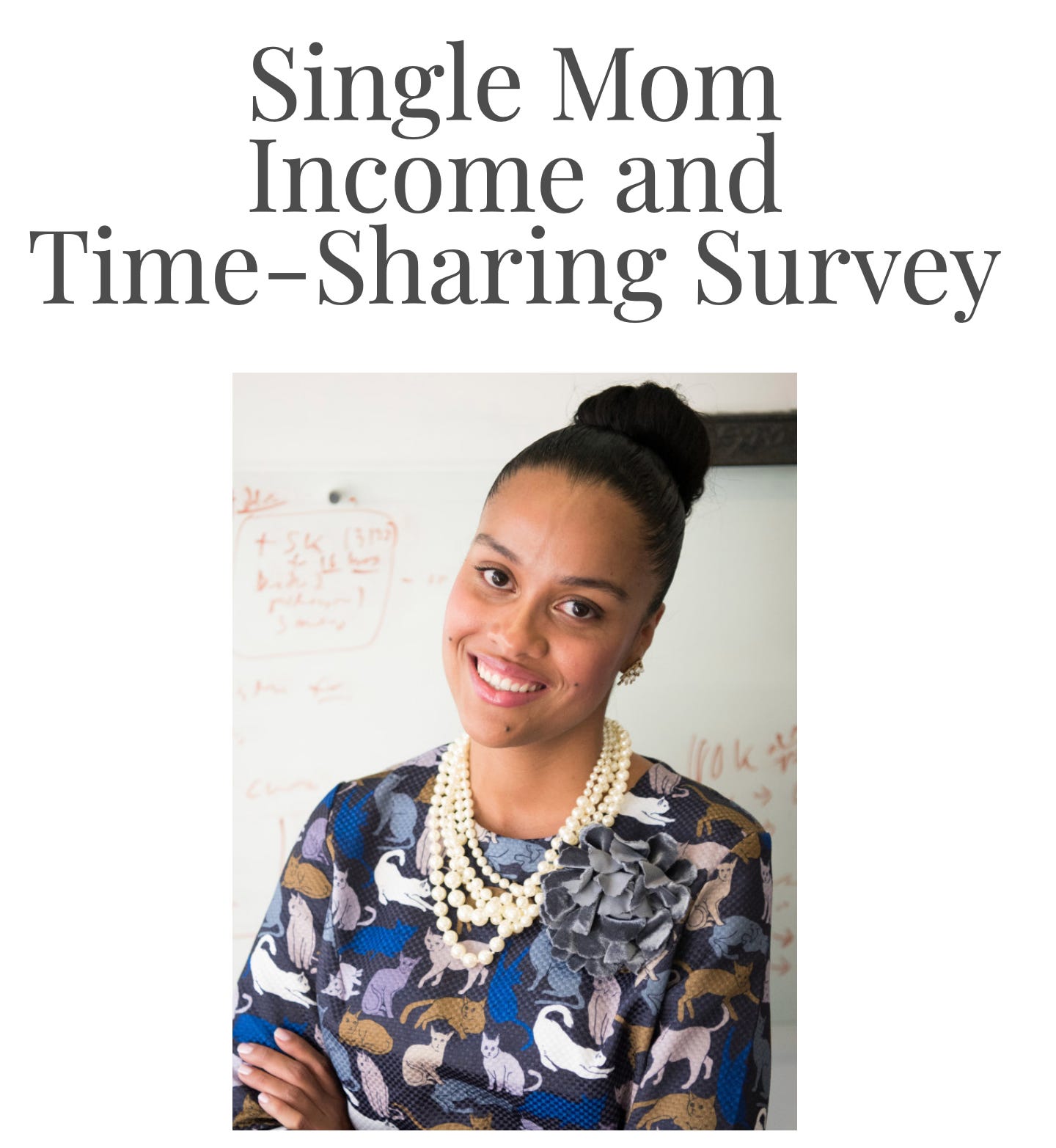Single moms with 50/50 co-parenting schedules earn more, survey of 2,279 finds
The more parenting time equality single moms share with their kids' dads, the higher their income.
This was the biggest finding of Single Mom Income and Time-Sharing Survey, which polled 2,270 single mothers about their employment, income, time-sharing and related feelings.
The survey sought to understand the connection between single moms' parenting schedules and the women's income, attitudes about work, parenting and wellbeing.
“Emma Johnson is focusing on an important and almost completely overlooked piece of the complex gender equality puzzle. She is absolutely right to point out that while social norms around equal parenting may be slow to change, reforming laws and practices governing divorced couples could make a big and beneficial difference for single mothers and fathers relatively quickly.”
Anne-Marie Slaughter, CEO of New America
Problem: Motherhood penalty
Mothers overall experience a pay gap of 31%, with full-time working mothers earning a median of $55,276 from wages vs. $72,280 earned by fathers) [Bankrate, Census data]
Single mothers working full time in 2022 had a median annual income from paid work of $43,888 vs single fathers’ income of $52,728 — a 20% difference.
Married mothers’ median income is $60,000 and and married fathers’ income is $76,000— a 26% difference. [Center for American Progress]
Through this blog and related platforms, I have interacted with hundreds of thousands of single mothers over the past decade. Anecdotally, it was evident to me that moms who have more equality in their parenting schedules have an easier time building their careers and income than those who have majority responsibility for their children.
Meanwhile, many moms who have their kids in their physical care the majority or 100% of the time believe they could grow financially with more parenting equality.
This makes intuitive sense, as studies of married mothers find a correlation between equality at home and their professional success. Yet I could not find any data on single moms, parental time-sharing and income (such studies have since been published, however! Read more about how 50/50 laws in Spain and Sweden lead to more equal parenting and pay for all families in those countries.)
So, I set out to collect the data myself. The Single Mom Income and Parenting-Time Survey polled 2,279 U.S. single moms.
The big takeaway: More equality in time-sharing means higher earning for single moms
See the full results:
Single-mom survey highlights
More equality in time-sharing single mothers have with their children’s father correlates with higher income and more reports of feeling proud of their parenting.
A few survey highlights include:
Moms with a 50/50 parenting schedule are 54% more likely to earn at least $100,000 annually than moms whose kids are with them most of the time (with “visits” with the dad).
Moms with a 50/50 parenting schedule are more than three times (325%) more likely to earn $100,000 than single moms with 100% time with their kids.
Moms with 50/50 parenting schedules are more than twice as likely to earn $65,000+ than those with majority time, and nearly three-times as likely to earn that sum than moms with 100% parenting time.
13%, or 1 in 8, single moms have a 50/50 arrangement — and 98% of them are content with it.
51% of single moms surveyed have their children 100% of the time.
Equally shared parenting is popular with single moms: The majority of single moms, 53%, either already enjoy a 50/50 schedule or wish they had it.
9 in 10 single moms say they could earn more money if they had more equality in their parenting time
Moms with 50/50 parenting time are 34% more likely (23% vs. 15%) to say they feel “awesome and proud” of being a mom compared with moms who care for their kids 100% of the time.
About 70% of moms who have their kids 100% or majority time feel parenting gets in the way of self-care, vs just 50% of moms with 50/50 schedules.
About single moms in the United States:
There are 20 million single-parent led households with children in the United States, 16 million of whom are single mothers. More and more younger women are having children outside of “traditional” families, with 64% of millennial moms having at least one child outside of marriage (Johns Hopkins).
While the vast majority of children of separated and divorced families spend most or all of their time with their mothers, there is a growing shift towards more equally shared parenting. Our culture is slowly but surely moving towards more egalitarian custody arrangements, while courts and policy are also making incremental, positive changes fueled by a growing body of research that finds that a 50/50 schedule benefits children.
In fact, A 2023 meta-analysis of thirty-nine studies published between 2010 and 2022, with a sample size of 1.5 million, controlling for income and the presence of stepparents, found that shared parenting was nearly as beneficial to children as being raised by married, cohabiting parents. “Systematic review and theoretical comparison of children’s outcomes in post-separation living arrangements.” University of Lausanne, Switzerland.
Today, six states have passed laws making equal parenting time the rebuttable presumption: Arizona, Arkansas, Florida, Kentucky, Missouri and West Virginia.



